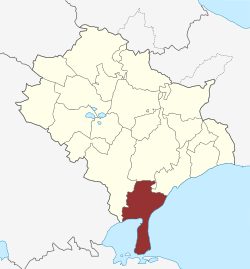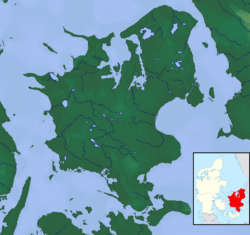Roholte
| Roholte | |
|---|---|
| Village and parish | |
|
Roholte Church | |
 Parish location in Faxe Municipality | |
 Roholte Village location in Region Zealand | |
| Coordinates: 55°11′44″N 12°05′26″E / 55.19556°N 12.09056°ECoordinates: 55°11′44″N 12°05′26″E / 55.19556°N 12.09056°E | |
| Country | Denmark |
| Region | Region Zealand |
| Municipality | Faxe |
| Time zone | CET (UTC+1) |
| • Summer (DST) | CEST (UTC+2) |
Roholte is a village and parish in Faxe Municipality, Region Zealand, Denmark. By road it is located 10.5 kilometres (6.5 mi) south of Faxe, and 83.2 kilometres (51.7 mi) southwest of Copenhagen.[1] Of note is Roholte Church, the parish church, which was built in 1441, and the Morten Roholte sports club.
History
The area around Roholte has been inhabited since the Stone Age. There is also evidence of a Viking community there. The origin of the village can be ascribed to the establishment of a large trading post just south of Roholte's present location. As the height of the land in the area increased, the sea retreated while trade gave way to agriculture and forestry.[2]
"The Society for Improvement of Cattle Breeding in Roholte Parish" was founded in 1884; the Royal Veterinary and Agricultural College noted it to be the first "Bull Club" or breeding society in Denmark. The society was formed by 36 farmers who purchased a superior quality bull to breed with the members' cows.[3]
The Danish poet Karl Gjellerup who in 1917 was awarded the Nobel Prize in Literature was born at Roholte's rectory in 1857.[4] The novelist, Louise Cathrine Elisabeth Biørnsen (1824-1899), was also born in Roholte.[5]
Cityscape
The sites of the houses in the village have varied over the years. Initially they were situated close together but after many were destroyed by fire, the trend was to separate them out over the nearby countryside. However, after a number of burglaries, they again became more closely grouped around the centre of the village as they stand today. Roholte has therefore become a village of high historical interest with its carefully placed houses and farmsteads.[2]
Notable buildings
- Roholte Church
The church was built in 1441 in a decorative Late Gothic style with ribbed gables and horizontal belts of limestone and brick along the walls of the nave and around the tower. Its major attraction is the font which was originally intended for Roskilde Cathedral. Its 15 panels depict angels and the apostles in shallow reliefs.[6]
- Old school
In 1908, a school building large enough to accommodate the increasing number of children in the village and its surroundings was completed. It was built in a style similar to that of the adjacent church. It was taken out of commission in the early 1980s as there were not enough pupils to warrant its existence.[2] Recently, however, the cultural authorities have been discussing a proposal to give the school the status of a heritage-listed building in view of its local history and its architecture, probably the work of Jens Ingwersen, especially as it is built in brick and limestone reflecting the features of the church which stands opposite.[7]
References
- ↑ Google (8 May 2013). "Roholte" (Map). Google Maps. Google. Retrieved 8 May 2013.
- 1 2 3 Flemming Petersen, "Roholte og Vindbyholt", Kalklandet.dk. (Danish) Retrieved 9 May 2013.
- ↑ Landbrugsrådet (Denmark); Bredkjær, Niels; Drejer, Aage Axelsen; Henrik Hauch; Arne Høgsbro Holm (1935). Denmark: Agriculture. Agricultural Council. p. 194.
- ↑ "The Nobel Prize in Literature 1917: Karl Gjellerup, Henrik Pontoppidan", Nobelprize.org. Retrieved 9 May 2013.
- ↑ Wilson, Katharina (1991). An encyclopedia of continental women writers. 1. A - K. Garland Publishing, Incorporated. pp. 132–. ISBN 978-0-8240-8547-6.
- ↑ Chr. Axel Jensen and Victor Hermansen, "Præsto Amt, Danmarks Kirker", Nationalmuseet, Copenhagen, 1933, pages 549–558. (Danish)
- ↑ "Referat 12/12-2012: Det Sæarlige Bygningssyn", Kultur Styrelsen. (Danish) Retrieved 9 May 2013.
.jpg)